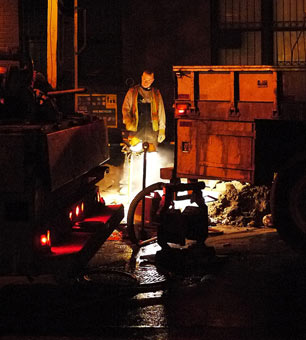Honest, paywall-free news is rare. Please support our boldly independent journalism with a donation of any size.
On Sunday, after the 8,500 members of Utility Workers Union of America (UWUA) Local 1-2 in New York City refused to agree to concessions, Con Ed responded by locking them out of work, creating one of the largest lockouts in recent memory. But it will be a real test for Con Ed to see just how long they are able to keep their workers locked out as a massive heat wave hits the city and its power system threatens to buckle.
The lockout is the first work stoppage to occur at Con Ed since union workers went on strike in 1983. The UWUA accuses the company of asking for big concessions on both health care and pensions, as well as bargaining in bad faith, haggling over whether the company or workers should pay for safety equipment that is required by federal law.
“They were bargaining in bad faith from the get go,” says UWUA Local 1-2 spokesman John Melia. “They locked us out so we can’t have a serious talk about issues with them. They didn’t really have a proposal, they had dictation. There was no give and take. It was annihilation. They are blowing smoke up everyone’s ass and they locked us out.”
After the union and Con Ed were unable to reach a new agreement, the union offered to continue working under the terms of its expired contract. Con Ed, however, said it would only allow the union to continue working if the union pledged to give seven days’ notice before going out on strike, which the union refused to do. On Sunday, Con Ed initiated the lockout, bringing in a contingency workforce made up of 5,000 managers, former retirees crossing the picket line, and outside replacement workers.
“In order to protect customers we need a guarantee that there won’t be a sudden work stoppage,” a Con Ed spokesman told Crain’s Business New York. “We need to run the system safely and reliably and a sudden work stoppage would put that in jeopardy.”
The union questions Con Ed’s decision to bring in replacement workers at a time when residents fighting the heat could lead to greater pressure on Con Ed’s system. Melia says the replacement workers currently performing the jobs out in the field are either supervisors who haven’t performed fieldwork in years or outside replacement workers, some of whom are fresh out of trade school.
“Look, they are going to get someone killed,” says Melia. “This phantom army of 5,000 that they have says they can handle it, but they already put someone in the hospital. They are going to get someone killed.” Melia claims that a replacement worker at a Brooklyn substation was hospitalized after suffering burns.
Con Ed could not be reached for comment, but a press release on their website Con Ed said, “50 percent of the company management employees assigned to maintain essential service for field work have moved up through the union ranks, and all company personnel have been preparing for the possibility of a union work stoppage for months.”
While the union tries to pit consumers against Con Ed for locking them out and potentially jeopardizing their electrical service, Con Ed is trying to pin the blame for the lockout on workers for keeping consumer prices high. In its press release Con Ed said it “appreciated the hard work of its union employees, but that it must work to achieve a contract that is fair and equitable for both employees and customers. Con Ed said its negotiators have presented numerous proposals to the union leadership to address long-term wage and benefit issues, in an effort to meet the needs of employees while respecting the cost concerns of customers.”
The UWUA and allied community groups, though, are attempting to mobilize support behind the union with the slogan “Cool Off Con Ed.” In an email blast to residents in the New York City area, Working Families Party Deputy Director Bill Lipton wrote that “Con Ed has made $5.9 billion since 2008. But instead of paying taxes like you and me, the company received a federal tax refund of $74 million during that time.” Lipton also asked residents to sign a petition demanding that Con Ed end the lockout.
A federal meditator is expected to reconvene negotiations between the company and the union on Thursday. For now, the 8,500 union workers of Con Ed will remain where an increasing number of union workers find themselves – locked out of their jobs.
“It’s totally fucking insane,” says Melia. “This is off the hook.”
Trump is silencing political dissent. We appeal for your support.
Progressive nonprofits are the latest target caught in Trump’s crosshairs. With the aim of eliminating political opposition, Trump and his sycophants are working to curb government funding, constrain private foundations, and even cut tax-exempt status from organizations he dislikes.
We’re concerned, because Truthout is not immune to such bad-faith attacks.
We can only resist Trump’s attacks by cultivating a strong base of support. The right-wing mediasphere is funded comfortably by billionaire owners and venture capitalist philanthropists. At Truthout, we have you.
Truthout has launched a fundraiser, and we have only 48 hours left to raise $21,000. Please take a meaningful action in the fight against authoritarianism: make a one-time or monthly donation to Truthout. If you have the means, please dig deep.
